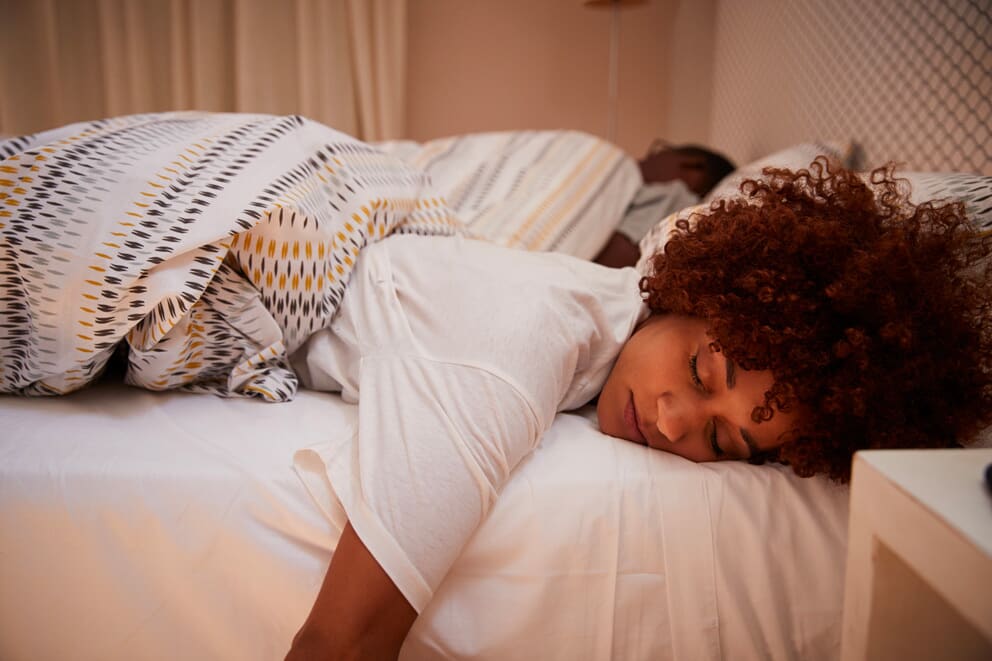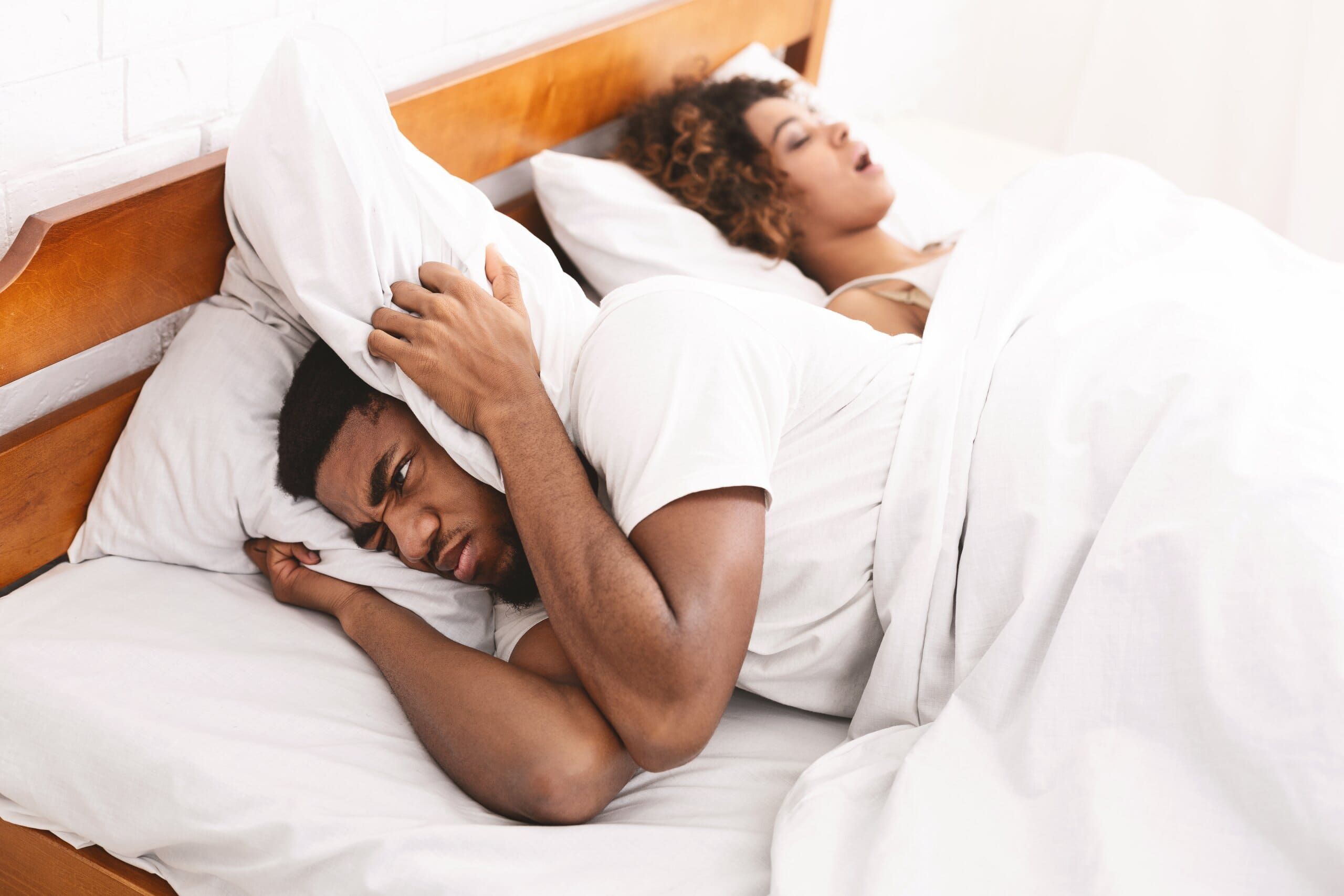If there’s one thing that can ruin a good night’s sleep, it’s a partner that snores. Or maybe you’re the one doing the snoring and keeping your loved one awake every night? While it may seem trivial, it can have a big impact on your sleep quality. So, you might be looking at how to stop snoring.
In the vast majority of cases, snoring is relatively harmless. But it can also be an indication of other underlying health problems. To keep you and your partner happy and healthy, there are some things you can do to minimise the impact of snoring.
Why do people snore?
Snoring is the sound of your soft palate and other tissue in the mouth, nose and throat vibrating. If there’s a blockage (whether that’s as a result of blocked sinuses, the throat being slightly closed due to the angle of the head and neck, or another reason), it causes this soft tissue to vibrate.
The type of snoring will indicate which area of soft tissue is vibrating. So, a soft, gentle snore indicates that your nasal passages are blocked. While a deep, loud snoring sound is a sign that the back of the throat is blocked.
You won’t snore all night long. Initially, most people are quiet for the first hour and a half of sleep. Snoring tends to occur once you enter the deep sleep stage. It is most often caused by sleeping on your back.

How to stop snoring
In the majority of cases, snoring cannot be ‘cured’, but it can be managed. If you discover the source of your snoring, you may be able to reduce it from a window-shaking rumble to a soft purr! Here are a few more tips to help you cut down on your nighttime noises.
1. Sleep on your side rather than your back
If you sleep on your back, you’re more likely to snore than those who sleep on their sides. The reason back-sleepers snore is that the tongue, neck tissue and chin press down on the airways. This disrupts the airflow.
This causes turbulence, which in turn causes the soft tissue at the back of the throat to vibrate. Switching to side sleeping helps keep the pressure off your airways. It, therefore, minimises the chances of snoring.
Check out our best type of mattress for side sleepers guide, for more tips.
2. Try and quit smoking
Smoking not only affects your long-term health, but it could be making you snore, too. Cigarette and tobacco smoke irritates the airways and the throat, which can cause swelling. A build-up of catarrh also blocks not just the throat but the nasal passages. This interrupts the flow of air and causes the soft tissue to vibrate.
Vaping can also cause irritation. So, if you do smoke or vape, try to avoid doing so before you go to bed. This should give your throat a chance to relax.
3. Avoid alcohol before you go to sleep
Drinking before you go to bed may be a traditional way to help you drift off. But it can trigger some pretty substantial snoring sessions, too! Alcohol relaxes the muscles in the throat, which removes the rigidity around the airways. That sets off the vibrations in the soft tissue once again.
4. Maintain a good diet
A healthy diet and avoiding being overweight are beneficial in so many ways, including cutting down on snoring. If you’re overweight, the fatty tissue that builds up around the neck and throat can press down on your airways when you’re asleep. This is why people who are overweight tend to snore more.
By reducing your weight and keeping to a healthy lifestyle, you’ll improve both your breathing and your general well-being. You’ll also develop better sleep patterns that are less likely to be interrupted by snoring.
5. Get new pillows
Something as simple as buying new pillows could make all the difference to your snoring. Just like any other bedding, pillows can gradually accumulate dust, skin flakes and pathogens that can trigger a reaction such as rhinitis. One of the symptoms of this is snoring. So, you might want to consider replacing those tired, flat old pillows with something a little more hygienic.
Hypoallergenic pillows will cut down on the number of fine particles around your nose and mouth. So, it’s less likely that you’ll react to dust and general canker.
The position and shape of your pillow can also make a big difference. If your pillow isn’t giving you the support you need, you could be blocking off your airways and causing that soft tissue to vibrate again. Pillows should be comfortable, but not too plumped up. Simply swapping from two pillows to one could solve the problem.
6. Look into the possibilities of surgery
Sometimes, snoring is caused by a medical condition such as sleep apnoea, which may require intervention. This can range from oxygen masks that are worn over the mouth and nose at night, to full-blown surgery.
Enlarged adenoids at the back of the nose can block the airflow and cause snoring. This is probably the last resort for most people. Surgery of this kind is drastic, invasive, and not without risks. It may not even sort the problem at all.
There are also various devices on the market that can help, from something as simple as a sticking plaster that goes across the nose and opens up the nostrils, through to ionisers and a wide range of other implements that may (or may not) help.

What are the best pillows to stop snoring?
Coolflex® Hybrid ICE Cool Gel Memory Foam Pillow - The body-cushioning memory foam filling contours to your unique head and neck shape, while an innovative cooling pad offers you that 'cool side of the pillow' feeling whenever you want it. By moulding to your body, this pillow is able to provide with with personalised support that helps to keep your head at the perfect angle to prevent snoring.
Silentnight Soft As Silk Pillow - The soft hollowfibre filling of this pillow eases the pressure on your head and neck, preventing your shoulders from cramping up towards your head. This promotes air flow through your airways, and gently tilts your head upwards so you aren't lying flat. This pillow is the perfect snoring preventative measure if you're not a fan of memory foam pillows or want something with excellent cushioning. Plus, this product comes as a pair, so you can enjoy two pillows yourself or share with a partner.
Hypnos High-Profile Latex Pillow – Because it’s deep and has plenty of support, this pillow allows you to ditch that second pillow and just use the one. That means your neck isn’t being compressed and keeps the airways open. This allows the air to flow without irritating the back of your throat. The natural latex construction also means it’s hypoallergenic, so you'll have a more hygienic sleeping environment, too.
Do anti-snore pillows work?
No pillow can be 100% guaranteed to stop snoring entirely, but they can reduce them by keeping your airways open.
You should consider your sleeping position and how this will impact how effective an anti-snoring pillow will be. If you sleep on your back, for example, a pillow that keeps your head gently titled upright will help to prevent snoring by opening your airways.
What is the best mattress for people who snore?
SleepSoul Wish 3000 Series Pocket Cool Gel Mattress – A medium-firm mattress that combines a pocketed sprung core with layers of memory foam to provide exceptional support and cushioning. The medium-firm rating makes it ideal for side sleeping, and with orthopaedic support it aligns the spine nicely, helping to open the airways. It creates a cushioned effect that holds the body in position without feeling too restrictive.
Tuft & Springs Ortho Brilliance 2000 Mattress – The use of natural fibres in this premium quality mattress means that you’re less likely to suffer from allergic reactions to dust. This minimises the possibility of conditions such as rhinitis causing the sinuses to block, which in turn results in snoring. The Ortho Brilliant 2000 has a firm rating, making it exceptionally good at keeping your posture in control, which also helps to prevent snoring.
SleepSoul Space 2000 Pocket Memory Pillow Top Mattress - A firm base and a softer pillow-top extra layer gives you all the cushioning and support you need, eliminating pressure on heavy pressure points such as the hips and shoulders. This keeps your body in the correct position for breathing, preventing the airways from blocking. Hypoallergenic and easy to care for, this mattress also has a Which? Best Buy Award for quality.






